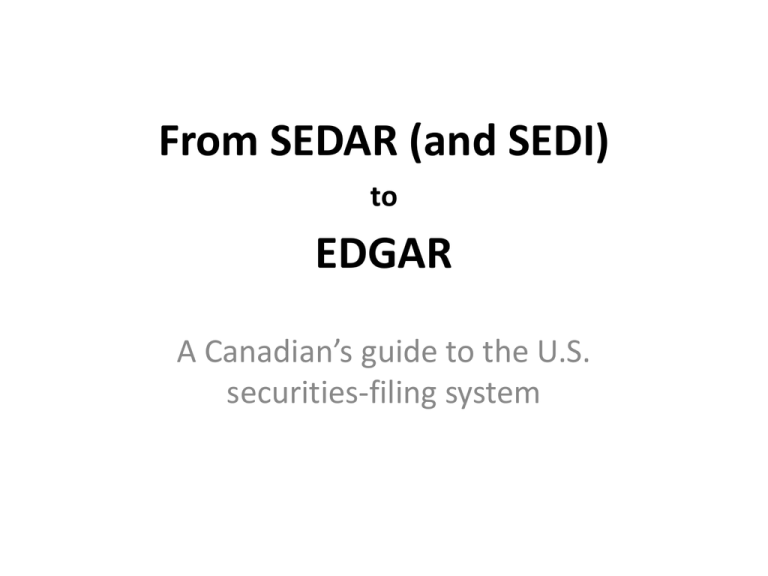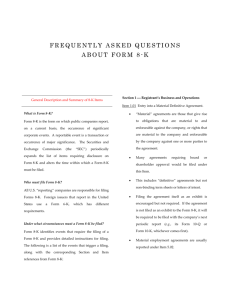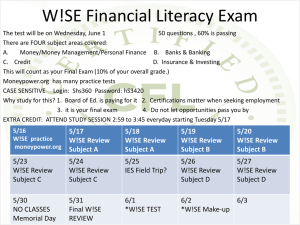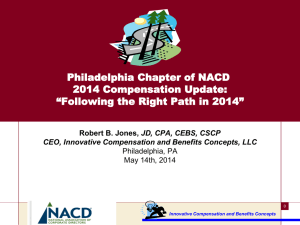Powerpoint
advertisement

From SEDAR (and SEDI) to EDGAR A Canadian’s guide to the U.S. securities-filing system Corporate securities filings in the U.S. are mandated by either the Securities Act of 1933 or Securities Exchange Act of 1934 and take their names from the legislation. Other than that, I can offer no explanation for the confusing combinations of letters, numbers and dashes. PERIODIC FINANCIAL REPORTS EDGAR: • 10-K: Annual report • 10-K/A: Amended versions SEDAR: • Audited annual financial statements • Annual information form • Certification of annual filings. By combining these elements into one report, the typical 10-K exceeds 100 pages and can run thousands. (Realogy Corp.’s 2011 10-K filed in March is 2,200 pages when attachments are counted.) Examples of attachments include material business contracts and bank-loan arrangements and executive employment agreements. PERIODIC FINANCIAL REPORTS EDGAR: • 10-Q: Quarterly reports (three times per year) • 10-Q/A: Amended versions SEDAR: • Interim financial statements/report • MD&A • Certification of interim filings BOARD, COMPENSATION, AND ANNUAL SHARE OWNERSHIP DATA: EDGAR: • PRE14A: Preliminary proxy statement • DEF14A: Definitive proxy statement • DEFA14A: Additional materials to a definitive proxy statement SEDAR: • Management information circular • Form of proxy The reporting for executive compensation is strikingly similar between the two countries. NEWS ITEMS: EDGAR: • 8-K and 8-K/A: “Current report” SEDAR: • News release An 8-K must be filed four business days after the event that triggers the need to file the report. What triggers an 8-K? http://www.sec.gov/about/forms/form8-k.pdf What triggers an 8-K? (cont.) Section 1 - Registrant’s Business and Operations Item 1.01 Entry into a Material Definitive Agreement Item 1.02 Termination of a Material Definitive Agreement Item 1.03 Bankruptcy or Receivership Item 1.04 Mine Safety – Reporting of Shutdowns and Patterns of Violations What triggers an 8-K? (cont.) Section 2 - Financial Information Item 2.01 Completion of Acquisition or Disposition of Assets Item 2.02 Results of Operations and Financial Condition Item 2.03 Creation of a Direct Financial Obligation or an Obligation under an Off-Balance Sheet Arrangement of a Registrant Item 2.04 Triggering Events That Accelerate or Increase a Direct Financial Obligation or an Obligation under an Off-Balance Sheet Arrangement Item 2.05 Costs Associated with Exit or Disposal Activities Item 2.06 Material Impairments What triggers an 8-K? (cont.) Section 3 - Securities and Trading Markets Item 3.01 Notice of Delisting or Failure to Satisfy a Continued Listing Rule or Standard; Transfer of Listing Item 3.02 Unregistered Sales of Equity Securities Item 3.03 Material Modification to Rights of Security Holders What triggers an 8-K? (cont.) Section 4 - Matters Related to Accountants and Financial Statements Item 4.01 Changes in Registrant’s Certifying Accountant Item 4.02 Non-Reliance on Previously Issued Financial Statements or a Related Audit Report or Completed Interim Review What triggers an 8-K? (cont.) Section 5 - Corporate Governance and Management Item 5.01 Changes in Control of Registrant Item 5.02 Departure of Directors or Certain Officers; Election of Directors; Appointment of Certain Officers; Compensatory Arrangements of Certain Officers Item 5.03 Amendments to Articles of Incorporation or Bylaws; Change in Fiscal Year Item 5.04 Temporary Suspension of Trading Under Registrant’s Employee Benefit Plans Item 5.05 Amendments to the Registrant’s Code of Ethics, or Waiver of a Provision of the Code of Ethics Item 5.06 Change in Shell Company Status Item 5.07 Submission of Matters to a Vote of Security Holders. Item 5.08 Shareholder Director Nominations What triggers an 8-K? (cont.) Section 6: Asset-backed securities only Section 7: Regulation FD Section 8: Other events What triggers an 8-K? (cont.) Section 9 - Financial Statements and Exhibits Item 9.01 Financial Statements and Exhibits Example of an 8-K UNITED STATES SECURITIES AND EXCHANGE COMMISSION FORM 8-K/A CURRENT REPORT Date of Report (Date of earliest event reported): August 11, 2011 Canada (State or other jurisdiction of incorporation) TIM HORTONS INC. (Exact name of registrant as specified in its charter) Item 5.02 Departure of Directors or Certain Officers; Election of Directors; Appointment of Certain Officers; Compensatory Arrangements of Certain Officers. Tim Hortons Inc. (the “Corporation”) is filing this Amendment No. 1 to its Current Report on Form 8-K filed on May 27, 2011, which announced that effective as of May 24, 2011, Mr. Paul D. House, the Corporation’s Executive Chairman, was appointed to the additional roles of President and CEO until a successor has been appointed. On August 11, 2011, the Board of Directors of the Corporation determined that for so long as Mr. House is serving as President and CEO, his compensation should be substantially similar to the compensation that Mr. Donald B. Schroeder received as President and CEO prior to his departure from the Corporation. Due to the expected short-term nature of Mr. House’s current tenure as President and CEO as well as the fact that, prior to his appointment as President and CEO, Mr. House’s compensation was structured to be more aligned with non-employee director compensation, the Board concluded that long-term compensation in the form of stock options with tandem stock appreciation rights, which constituted a part of Mr. Schroeder’s compensation, would not be appropriate for Mr. House’s compensation. Given the foregoing, the following changes were made to Mr. House’s compensation, the main elements of which consist of base salary, short-term incentive or annual bonus, and long-term incentive compensation. The Board approved an increase in Mr. House’s compensation so that, effective as of May 24, 2011, Mr. House will receive a base salary of Cdn.$750,000, on an annualized basis. Mr. House will be eligible for a performance-based short-term incentive award under the Corporation’s Executive Annual Performance Plan (the “EAPP”) of Cdn.$1,000,000 at “target” performance, provided that the short-term incentive payout will be prorated to the period during which Mr. House serves as President and CEO in 2011. The amounts payable to Mr. House under the EAPP are dependent upon the extent to which the Corporation achieves operating income (or EBIT) and net income performance objectives established for the EAPP in February 2011. Mr. House will be eligible for a long-term incentive award in an aggregate amount of Cdn.$2,000,000 at “target” under the Corporation’s 2006 Stock Incentive Plan (the “SIP”), consisting of: (i) Cdn.$1,000,000 at “target” delivered through performance- based restricted stock units (“P+RSUs”) to be granted in 2012 after the end of the performance period, which P+RSUs will cliff vest 30 months after grant; and (ii) Cdn.$1,000,000 delivered as time-vested restricted stock units (“RSUs”), reduced in value by the May 2011 RSU award of Cdn.$200,000 previously granted to Mr. House, also to be granted in 2012, vesting over a 30-month period in three equal installments. The P+RSUs and the RSUs will be granted in accordance with the Corporation’s Equity Grant and Settlement Policy. The long-term incentive awards described above actually made to Mr. House will be prorated to the period during which Mr. House serves as President and CEO in 2011. The amounts payable to Mr. House on account of P+RSUs under the SIP are also dependent upon the extent to which the Corporation achieves the operating income (or EBIT) performance objective established for the P+RSUs in February 2011. Example of a story from an 8-K Tim Hortons board boosts acting CEO pay The board of Tim Hortons coffee shops has decided to pay Paul House the same rate as the previous CEO, though still calls his position temporary. August 22, 2011 at 6:30 PM EDT By DAVID MILSTEAD From Tuesday's Globe and Mail For the past couple of months at Tim Hortons Inc. , Paul House has been doing the CEO work previously done by Donald Schroeder. Now, the company’s board has decided Mr. House should get Mr. Schroeder’s pay cheque as well. Tims said in a U.S. securities filing that Mr. House will receive a raise to $750,000 a year, retroactive to his May 24 start date; he had previously been earning $300,000 annually. He will also be eligible for a bonus of up to $1.5-million if Tims exceeds its maximum profit targets, and has been given stock awards worth $1.8-million, the majority of which he’ll forfeit if the company’s performance goals are not met. Both the bonus and the stock awards will be pro-rated to reflect the amount of time he serves as chief executive officer this year. Mr. House had been serving as the company’s executive chairman after a previous stint as CEO. He stepped back into the CEO role in May on Mr. Schroeder’s unexpected departure. Tim Hortons says in the filing that its board “determined that for so long as Mr. House is serving as president and CEO, his compensation should be substantially similar to the compensation that [Mr. Schroeder] received as president and CEO prior to his departure from the corporation.” The filing suggests, however, that Mr. House’s role remains temporary, referring to “the expected short-term nature of [his] current tenure.” Mr. House will get $1-million in performance-based restricted stock units next year if Tims hits an undisclosed target for operating income. He must hold the stock, unable to sell it, for 30 months, per the company’s stock plan. He will also receive $800,000 in stock next year that vests, or becomes sellable, in three equal instalments over the succeeding 30 months. STOCK SALE DATA: • Form 3: Initial statement of share ownership, filed when a company goes public or an insider joins the company • Form 4: Changes in share ownership • Form 5: Annual statement of changes in share ownership • 144: Sale of stock by an insider (typically of unregistered shares acquired when the company was private) OTHER STOCK DATA: • Schedule 13D: Report of beneficial ownership of 5% of a company’s voting shares (typically by an investor who wishes to influence the company’s affairs) • Schedule 13G: Report of beneficial ownership of between 5% and 20% of a company’s voting shares (typically by an investor who does not wish to influence the company’s affairs) • Schedule 13F: Investment manager holdings IPOs and REGISTRATION STATEMENTS: • S-1: Initial registration of stock or other securities • S-2: Simplified form discontinued in 2005 • S-3: Registration of securities by an issuer that already has registered securities in the marketplace • S-4: Registration of securities used in a merger OF PARTICULAR CANADIAN INTEREST: • 20-F or 40-F: Registration of securities or annual report by a foreign issuer • 6-K: report of foreign issuer 6-Ks are the catch-all for everything a U.S. company would file in 10-Qs and 8-Ks. OTHER NEAT STUFF: • UPLOAD: Letter from the SEC to the company • CORRESP: Response from the company to the SEC • CT ORDER: Granting of a request to keep information confidential from disclosure • NO ACT: Letter from the SEC saying it will take no action against the company for engaging in a certain behavior Securities and Exchange Commission Forms List • http://www.sec.gov/about/forms/secforms.htm The benefits of commercial services: • EdgarPro • Morningstar Document Research (formerly known as “10-K Wizard.”) • Allow full-text searching for a much longer range of years than the nextgeneration EDGAR search function • Provide instantaneous email notifications of EDGAR filings based on geography, ticker or even full-text search Examples of possible searches: • All filings for a list of companies on your beat or in your coverage area • All filings that include a distinct keyword like “Anschutz” or “Romney” Other recommended reading: • “Financial Fine Print” by Michelle Leder • www.footnoted.com Contact info David Milstead (303) 800-6423, desk (303) 638-6291, cell davidmilstead@q.com My bio and recent investing columns for the Globe can be found at http://www.theglobeandmail.com/globe-investor/investment-ideas/davidmilstead/ Also easily found on Facebook, LinkedIn, Twitter or by Googling











